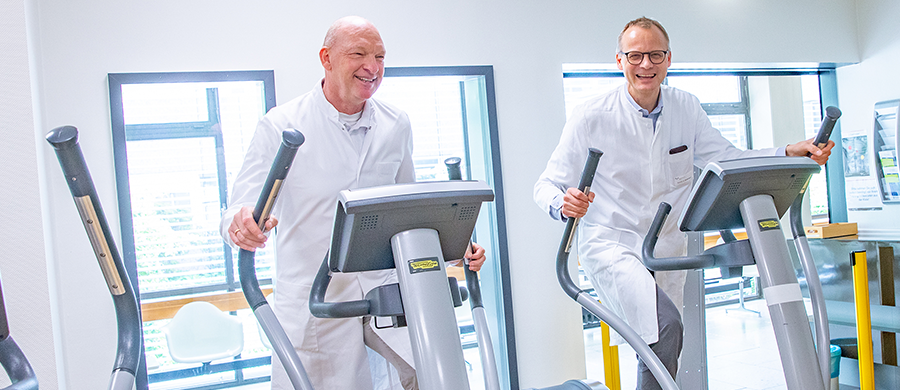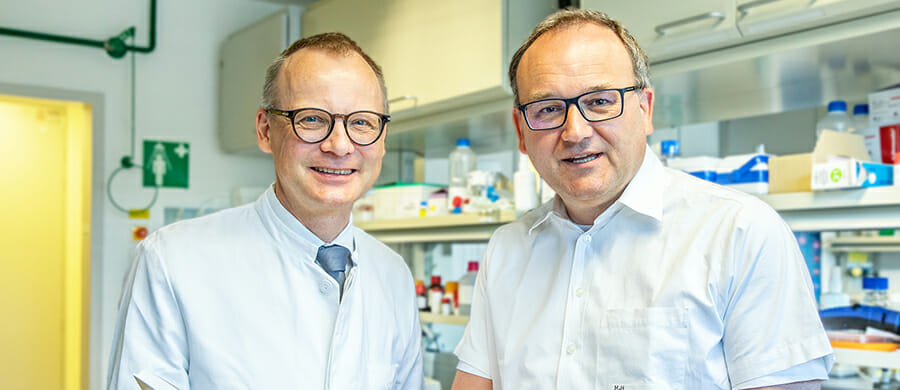HANNOVER MEDICAL SCHOOL (MHH)
Clinic for Gastroenterology, Hepatology, Infectiology and Endocrinology and the Clinic for Rehabilitation and Sports Medicine
DATA & FACTS
Project
PIECES – Towards large-scale adaptation and tailored implementation of evidence-based primary cancer prevention programmes in Europe and beyond (2023-2027)
Scientific contact
Professor Dr. Uwe Tegtbur,
Professor Dr. Heiner Wedemeyer
EU-Funding line
Horizon Europe – Mission Cancer
Projektleitung: Prof. Dr.-Ing. Arno Kwade
Projektname: „Li-Ion Pilot Lines Network“ (LiPLANET)
Keywords: Energie, Mobilität, Partner
With exercise against liver cancer
The MHH is participating in the EU project PIECES and aims to reduce the risk of cancer and improve liver health with personalized exercise programs.
About three million people in the European Union are affected by cancer. For 1.34 million of them, the disease is fatal. However, around 40 percent of cancer cases could be prevented through effective prevention strategies such as a healthier lifestyle and early detection. To achieve this, the EU has set up the “Mission Cancer” funding line, which supports cancer prevention projects. One of these is the PIECES project, a consortium of 16 members from ten EU countries, in which Hannover Medical School (MHH) is also involved with the Clinic for Gastroenterology, Hepatology, Infectiology and Endocrinology and the Clinic for Rehabilitation and Sports Medicine. The aim is to investigate why existing effective cancer prevention programs often fail when implemented in everyday life and how they can be better adapted to people’s needs and national conditions. The EU is now funding the project for four years with a total of 6.9 million euros. Of this, the MHH will receive around 680,000 euros.
Tool box for personalized fitness programs
“We have many good programs in the EU for primary cancer prevention, but unfortunately they don’t always work everywhere,” says Professor Dr. Heiner Wedemeyer, director of the Department of Gastroenterology, Hepatology, Infectiology and Endocrinology. The PIECES project offers the opportunity to test the wide range of preventive measures, whose effectiveness has already been proven in controlled environments, under real-life conditions. In this context, subprojects address the improvement of the following risk factors: tobacco and alcohol consumption, physical inactivity, human papillomavirus (HPV) infections, UV exposure, and dietary factors. The MHH subproject focuses on exercise in relation to liver health.
“Sufficient physical activity not only reduces the risk of cardiovascular disease, but also of chronic inflammation, which increases the risk of a variety of cancers,” explains Professor Dr. Uwe Tegtbur. The sports physician has already proven this in several studies. “In a cooperation with Volkswagen AG and among employees of the MHH, we were able to show in the context of workplace health promotion that personalized fitness programs were able to reduce fitness and body weight and thus also health risk factors such as body fat, high blood pressure and blood sugar levels, and improve psychological stress and liver health,” says the director of the Clinic for Rehabilitation and Sports Medicine. This approach is now to be transferred to a digital platform and, as a tool box, will contain all the tools from which programs tailored precisely to individual needs can be put together. These include digital questionnaires to record the health and life situation and so-called wearables that measure and display performance as well as movement and activity progress. “In this way, we achieve individualized support that is independent of time and location, which picks up participants exactly where they are and motivates them to actively improve their health situation,” notes the sports physician.
Non-alcoholic fatty liver increases cancer risk
The physicians want to address liver cancer prevention in a very targeted way. “In Germany alone, around 20 million people have non-alcoholic fatty liver, mostly due to severe obesity,” says Professor Wedemeyer. If left untreated, non-alcoholic fatty liver disease (NAFLD) can develop into inflammation. This, in turn, can cause connective tissue cells in the liver to proliferate excessively (fibrosis) and eventually scar the liver tissue. Such cirrhosis of the liver increases the risk of tumor formation. “However, in non-alcoholic fatty liver disease, hepatocellular carcinoma can also occur before cirrhosis is present, so we need to intervene as early as possible,” stresses the gastroenterologist. “And if people get enough exercise, their liver values will also improve.” The combination of precisely tailored exercise training, preventive examinations and medical advice should help to reduce the rising number of NAFDL cases and thus also reduce the risk of cancer.
To ensure that the approach not only works in Germany but is also transferable internationally, PIECES is studying a package of measures on different cohorts across Europe. “In the end, our tool box should be combinable according to the modular principle in such a way that the right prevention program can be put together for each person, regardless of gender, nation, physical condition and living situation,” says Professor Tegtbur.

Author:
Kirsten Pötzke
Date:
13.06.2023
this might also interest you …

Project: D-Solve
Hepatitis D is by far the most severe form of chronic viral hepatitis, often leading to liver failure, liver cancer and death. However, knowledge about the disease is still very limited. The reason why those affected have very different courses of the disease is also still unknown. An international research project led by Professor Dr. Heiner Wedemeyer, …

Project: Challenge4impact
The implementation of the UN Sustainable Development Goals can only be reached globally. Universities educate the “change agents for tomorrow” and are thus required to enable students to acquire the necessary competencies. Challenge4Impact aims to develop new international learning opportunities based on the challenge-based learning approach.
